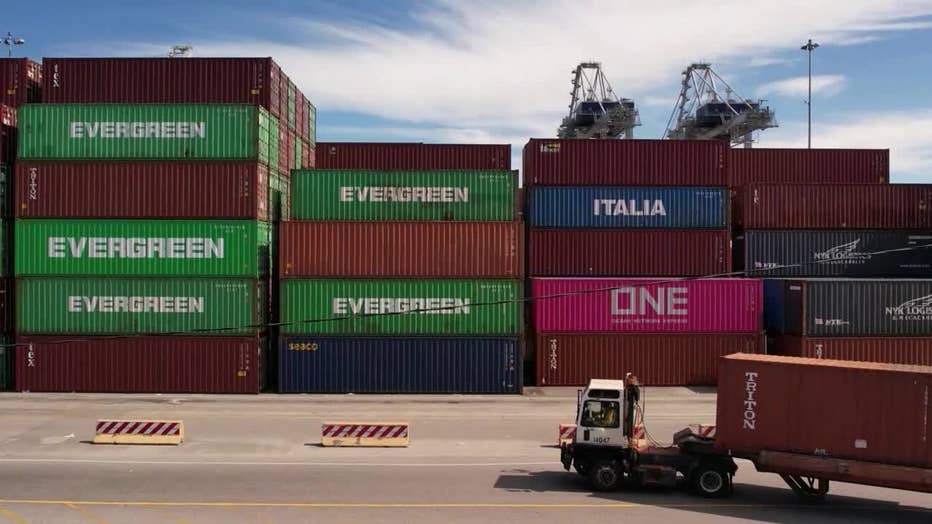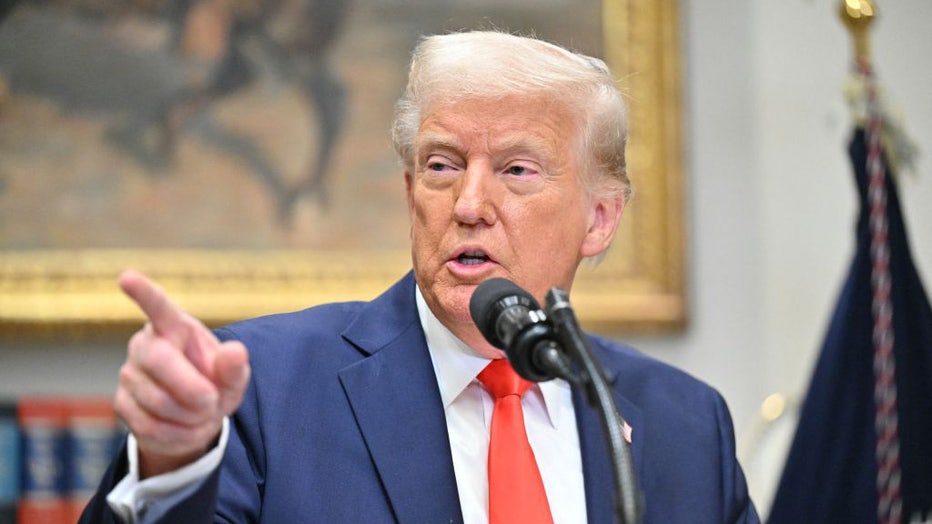Trump's tariffs on Mexico and Canada go into effect: Here's how they will affect Georgia
Traffics on Canada, Mexico and China
The Dow Jones Industrial Average dropped another 670 points, or 1.6 percent Tuesday after the latest round of President Donald Trump's tariffs went into effect. The countries affected goods from Mexico, Canada and China, who all responded in different ways
President Donald Trump's long-threatened tariffs against Canada and Mexico went into effect overnight, and Georgians may soon feel the impact.
What we know:
Starting just past midnight, imports from Canada and Mexico are now to be taxed at 25%, with Canadian energy products subject to 10% import duties.
The 10% tariff that Trump placed on Chinese imports in February was doubled to 20%. Beijing retaliated on Tuesday morning with tariffs of up to 15% on a wide array of U.S. farm exports. It also expanded the number of U.S. companies subject to export controls and other restrictions by about two dozen.
Canadian Prime Minister Justin Trudeau said his country would slap tariffs on more than $100 billion of American goods over the course of 21 days. Mexico's President Claudia Sheinbaum said the country will announce its own retaliatory tariffs on Sunday, saying that Mexico had a plan ready since January for this scenario.

The Canada and Mexico tariffs were supposed to begin last month, but Trump agreed to a pause to negotiate further with the two U.S. trading partners. The stated reason for the tariffs is to address drug trafficking and illegal immigration, and both countries say they’ve made progress on those issues. But Trump has also said the tariffs will only come down if the U.S. trade imbalance closes, a process unlikely to be settled on a political timeline.
What they're saying:
"It’s a very powerful weapon that politicians haven’t used because they were either dishonest, stupid or paid off in some other form," Trump said Monday at the White House. "And now we’re using them."
On Monday, the president announced that he plans to impose additional tariffs on overseas agricultural products.
"To the Great Farmers of the United States: Get ready to start making a lot of agricultural product to be sold INSIDE of the United States," the president said on his social media platform Truth Social. "Tariffs will go on external product on April 2nd. Have fun!"

US President Donald Trump speaks in the Roosevelt Room of the White House in Washington, DC, on March 3, 2025. (Photo by ROBERTO SCHMIDT/AFP via Getty Images)
The other side:
Democratic lawmakers were quick to criticize the tariffs, and even some Republican senators raised alarms.
Sen. Susan Collins, R-Maine, said she’s "very concerned" about the tariffs going into effect because of her state’s proximity to Canada.
How will the tariffs impact you?
How are the Trump administration’s tariffs on Canada, Mexico, and China impacting you?
"Maine and Canada’s economy are integrated," Collins said, explaining that much of the state’s lobsters and blueberries are processed in Canada and then sent back to the U.S.
Speaking after a meeting on U.S.-Canada relations on Monday after the tariff announcement, Trudeau said his country would impose 25% tariffs on $155 billion Canadian ($107 billion U.S.) worth of American goods, starting with tariffs on $30 billion Canadian ($21 billion U.S.) worth of goods immediately and on the remaining amount on American products in three weeks.
"Our tariffs will remain in place until the U.S. trade action is withdrawn, and should U.S. tariffs not cease, we are in active and ongoing discussions with provinces and territories to pursue several non-tariff measures," Trudeau said.
Mexico’s president said that the tariffs her country will respond with are "not in any way or with the purpose of starting an economic or commercial confrontation that unfortunately and regrettably is the opposite of what we must be doing."
"It’s inconceivable that they don’t think about the damage this is going to cause to United States citizens and businesses with the increase in prices for things produced in our country," Sheinbaum said. "Also the damage it will cause by stopping job creation in both countries. No one wins with this decision."
Georgia businessowners, economists respond
Local perspective:
One of the owners of Westview Corner Grocery in Southwest Atlanta says the new tariffs could impact a broad range of products. He said the obvious items are the ones that are made in Mexico or Canada. But he says even if it is not made in one of the impacted countries, they could use materials or packaging from them which could impact pricing.
"I would predict that starting next week, we will be monitoring cost increases," said Matt Garbett, co-owner of Westview Corner Grocery. "People don't realize that it's not just something that comes from Mexico or Canada or China, that aspects of it do, and all of them can tie into a local brewery having to raise prices on their beer because of aluminum."
What is doom spending?
Now that the Trump administration tariffs are in place, people are spending money now to try to avoid price increases later. That is called "doom spending."
Tom Smith, an Emory University Economist at the Goizueta Business School, says higher prices are inevitable.
"You're going to pay more for agricultural products, you're going to pay more for over-the-counter products, drugs," he said. "You're going to pay more for just about every good you're going to put in your shopping cart, definitely going to hit your wallet in a big way."
Consumers say they are worried about paying more.
"Everything is already too high, so that's going to make it even higher," said Wanda Baynes.
Dig deeper:
The impacts could be far-reaching for Americans, affecting everything from car and home prices and how much it would cost to fuel up at the pump.
Speaking to FOX 5 in February, Smith said people will see higher prices on everyday goods.
"Businesses are going to pass as many of those costs on to consumers as possible. Consumers are going to be upset immediately. They're so anxious about high prices as it is," Smith said.
Trump tariffs affect Georgia businesses
Metro Atlanta businesses that rely on products from Mexico and China are bracing for impact from the newly imposed tariffs by the Trump administration. The White House has ordered 25% tariffs on imports from Canada and Mexico, two of the U.S.'s largest trading partners.
One example of these higher prices will be from fruits and vegetables, like avocados from Mexico.
Smith also pointed out that many cars and trucks are assembled in Mexico and would fall under these tariffs.
"Ford is a publicly traded company, so they're going to pass those costs on to the person who's buying a Ford in March or April or May. So, you know, your next Ford might be more expensive than your last because now there's a tariff attached to that," Smith said.

Smith said the impact will also be strongly felt by Georgia farmers.
"When Mexico and Canada engage in retaliatory tariffs, then what's going to happen is that our farmers, like our pecan farmers, our Vidalia onion farmers right here in Georgia, they're not going to be able to export as many of their products to either Mexico or Canada or China, eventually. Which means, farmers in Georgia will see lower sales, lower revenue," Smith said.
What's next:
The tariffs may be short-lived if the U.S. economy suffers. But Trump could also impose more tariffs on the European Union, India, computer chips, autos and pharmaceutical drugs.
The Trump administration has suggested inflation will not be as bad as economists claim, saying tariffs can motivate foreign companies to open factories in the United States.
Still, it can take time to relocate factories spread across the world and train workers with the skills they need.
The Source: FOX 5's Brooke Zauner reported this story out of Atlanta. Additional reporting came from the Associated Press, previous FOX 5 reporting, and reporting from other FOX stations.

